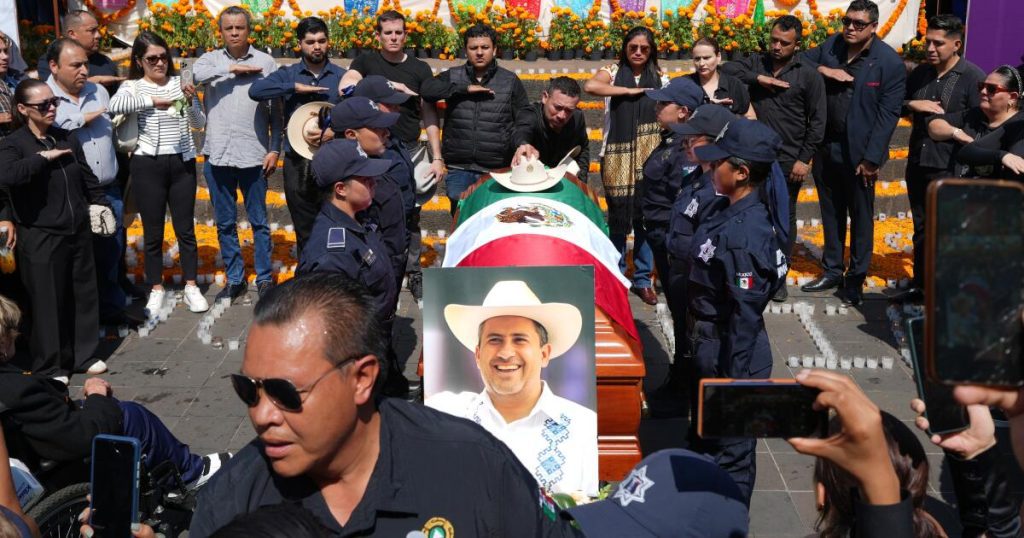Here’s a paraphrased version of the article, maintaining core information and formatted in HTML:
<div data-element="story-body" data-dateline="" data-subscriber-content="">
<h2>MEXICO CITY</h2>
<p>Carlos Manzo gained notoriety in Mexico for voicing what many politicians avoided: that cartels operated unchecked and required a strong response. As the mayor of a city in an avocado-producing region troubled by crime and violence, Manzo advocated for a forceful approach, suggesting that authorities should either subdue criminals decisively or eliminate them.</p>
<p>This controversial stance resonated with many in a country long scarred by drug-related violence, and he was often seen as a hero, notably recognized by his signature white cowboy hat.</p>
<p>However, his tough rhetoric and open criticism of the federal government's security policies led to numerous enemies. Manzo was aware of this danger, expressing concerns over being targeted by organized crime: “I don’t want to be just another murdered mayor,” he stated recently. “But it is essential not to let fear control us.”</p>
<p>Tragically, Manzo, aged 40, was shot and killed while attending a public Day of the Dead celebration in the main square of Uruapan, a city of 300,000 in Michoacán. His assassination, captured on video, sparked outrage across Mexico and in the United States.</p>
<p>Mexican President Claudia Sheinbaum, who often clashed with Manzo over security issues, mourned him as an “irreparable loss.” U.S. Deputy Secretary of State Christopher Landau shared a photograph of Manzo with his young son just before the attack, emphasizing U.S. support for deeper security cooperation with Mexico to combat organized crime.</p>
<h3>Rise of a Tough Stance Against Crime</h3>
<p>Manzo was part of a growing number of leaders in the Americas advocating a strong stance against crime. This group includes El Salvador's President Nayib Bukele, known for incarcerating thousands accused of gang affiliation, and former President Trump, who promoted a militarized approach to combating drug cartels.</p>
<p>The recent U.S. military operations have resulted in the deaths of numerous alleged drug smugglers, suggesting a potential for U.S. strikes against cartel operations in Mexico. However, such violent approaches clash with the security strategies of President Sheinbaum and her predecessor, Andrés Manuel López Obrador, who focused on addressing the underlying causes of violence, such as poverty and social issues.</p>
<p>Despite beginning his political career within López Obrador and Sheinbaum’s Morena party, Manzo became an independent and harshly criticized the ideology of “hugs, not bullets,” arguing that true justice required a firm response against criminals. He urged police in Uruapan to use lethal force against those resisting arrest, often condemning Sheinbaum’s perceived inaction against the cartels, despite some improvements in crime statistics since her term began.</p>
<p>Before his death, Manzo attended a crowded Day of the Dead event, mingling with attendees and broadcasting the celebration live on social media. His hopes for security quickly turned to chaos as gunfire erupted, leaving him critically injured on the ground.</p>
<p>David Saucedo, a security consultant, referred to the assassination as a “kamikaze attack,” indicating that the shooter was willing to die in the attempt. He noted that despite Manzo’s bravery, he lacked the necessary resources to combat the entrenched cartel problem effectively. The mayor’s murder underscored the daunting challenge of tackling organized crime at the municipal level in Michoacán, which has recently seen a surge in violent acts.</p>
<p><i>Cecilia Sánchez Vidal contributed to this report from The Times’ Mexico City bureau.</i></p>
</div>This paraphrase retains the essential details of the original article while rephrasing the content and structure.



